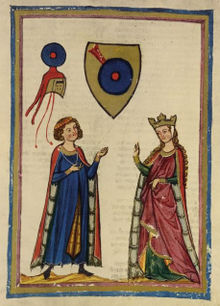- Der von Kürenberg
-
Der von Kürenberg or Der Kürenberger (Kuerenberg, Kuerenberger, fl. mid-12th century) was an middle-age poet, and one of the first named poets to write in Old High German language.
He was a nobleman, possibly from the area around the actual city of Linz. Some of the 14 stanzas that appear in Minnesangsfrühling group themselves into poems. His poems were most likely written before the concept of ideal courtly love was formulated. As their subject they have a more direct and less stylized relationship. Some are in dialogue form (Wechsel). The best known poem is the "falcon song". It is possible that both stanzas were spoken by a woman (it could also be argued that they were written by a woman). His poetry, as well as that of Dietmar von Eist (Aist), suggest that there may have existed a poetic form indigenous to the Upper Germany/Austria territory before the impact of the Provençal influence.
His poems contrast sharply with those of the later convention. So much so that some have been tempted to suggest that he disapproved of them. (But as Walsche says: This would be presuming too much). His poems are composed almost exclusively in an old Danubic form which is called the Nibelungenstrophe (the Germanic long-line). Most of his poems tell little stories. In one of the poems a woman stands and listens to the song of one knight among all the others. The knight sings "in Kürenberges wise". She states that "either he must leave the country, or she will enjoy his love." The poet's response is to call for his horse and armour and flee. This lady is unique in the poetry of the time in that she wishes to compel the knight's love and seeks to fulfill the promised eroticism of the knight's song. Strangely, one is left with the feeling that the knight was shocked to have been taken seriously. Der von Kürenberg paints bold images with few words and creates men and women who are bold and confident. The impression he leaves seems more true to what one might expect the men and women of a warrior-aristocracy to be like than that portrayed in the following generation's poetry.
Contents
Life
Like Ava, the first named female poet writing in German, der Kürenberger lived and worked in the area along the Danube river between Bavaria and Lower Austria. Conventionally he is associated with Linz. He was of knightly family and one of the early travelling singers (Minnesinger) common in this area.
Work
His poems were written in Middle High German between 1150 and 1170. Fourteen or fifteen of his verses have been preserved in the Codex Manesse, some of which may belong together as poems; the Falcon Song ("Falkenlied") below is the best known. Sometimes he is cited as the author of the Nibelungenlied, on the basis of the similarity of verse form, although on grounds of chronology this is extremely unlikely.
Original text English translation Ich zôch mir einen valken mêre danne ein jâr.
dô ich in gezamete als ich in wolte hân
und ich im sîn gevidere mit golde wol bewant,
er huop sich ûf vil hôhe und floug in anderiu lant.
Sît sach ich den valken schône fliegen:
er fuorte an sînem fuoze sîdîne riemen,
und was im sîn gevidere alrôt guldîn.
got sende si zesamene die gerne geliep wellen sin!I brought up a falcon for more than a year.
When I had him tamed as I wanted
And when I had adorned his feathers with gold,
He hopped up into the sky and flew to another land.
Since then I have seen the falcon flying:
He wore silken jesses on his feet,
And his feathers were all red-gold.
God bring together those who want to love each other!References
- Weil, Bernd Weil, 1985. Das Falkenlied des Kürenbergers. Frankfurt am Main.
External links
- (German) Der von Kürenberg in the German National Library catalogue (German)
- (German)Der von Kürenberg (Codex Manesse)
- (German)Kürenberg's Poems, Bibliotheca Augustana
Categories:- 12th-century writers
- Minnesingers
- People from Linz
Wikimedia Foundation. 2010.

